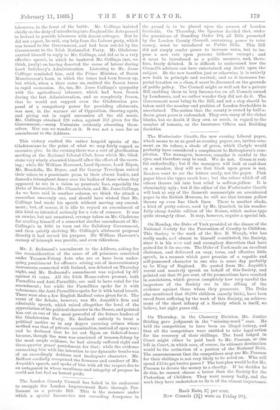Mr. J. Redmond's amendment to the Address, asking for 'the
reconsideration of the cases of all prisoners convicted under Treason-Felony Acts who are or have been under- going punishment for offences arising out of insurrectionary inovements connected with Ireland, was debated on Thursday 'night, and Mr. Redmond's amendment was rejected by 397 against 81 votes. All the Irish Home-rulers present, both Parnellite and Anti-Parnellite, are said to have voted for the amendment. but while the Parnellites spoke for it with vehemence, the Anti-Parnellites spoke for it with bated breath. There were also a few English Radical votes given for it. The event of the debate, however, was Mr. Asquith's firm and admirable speech, which raised altogether the level of the appreciation of his political character in the House, and pointed him out as one of the most powerful of the future leaders of the Gladstonian Party. He declined entirely to treat a political motive as in any degree excusing crimes whose method was that of private assassination, instead of open war ; and he declared that he let out Egan on ticket-of-leave because, though the man was convicted of treason-felony by the most ample evidence, he had already suffered eight and three-quarter years' punishment for that; while the evidence connecting him with the intention to use dynamite bombs was of an exceedingly dubious and inadequate character. Mr. Balfour cordially recognised the firmness and candour of Mr. Asquith's speech, and spoke of him with all the respect due to an antagonist in whose manliness and integrity of purpose he could not but feel an honest pride.


































 Previous page
Previous page